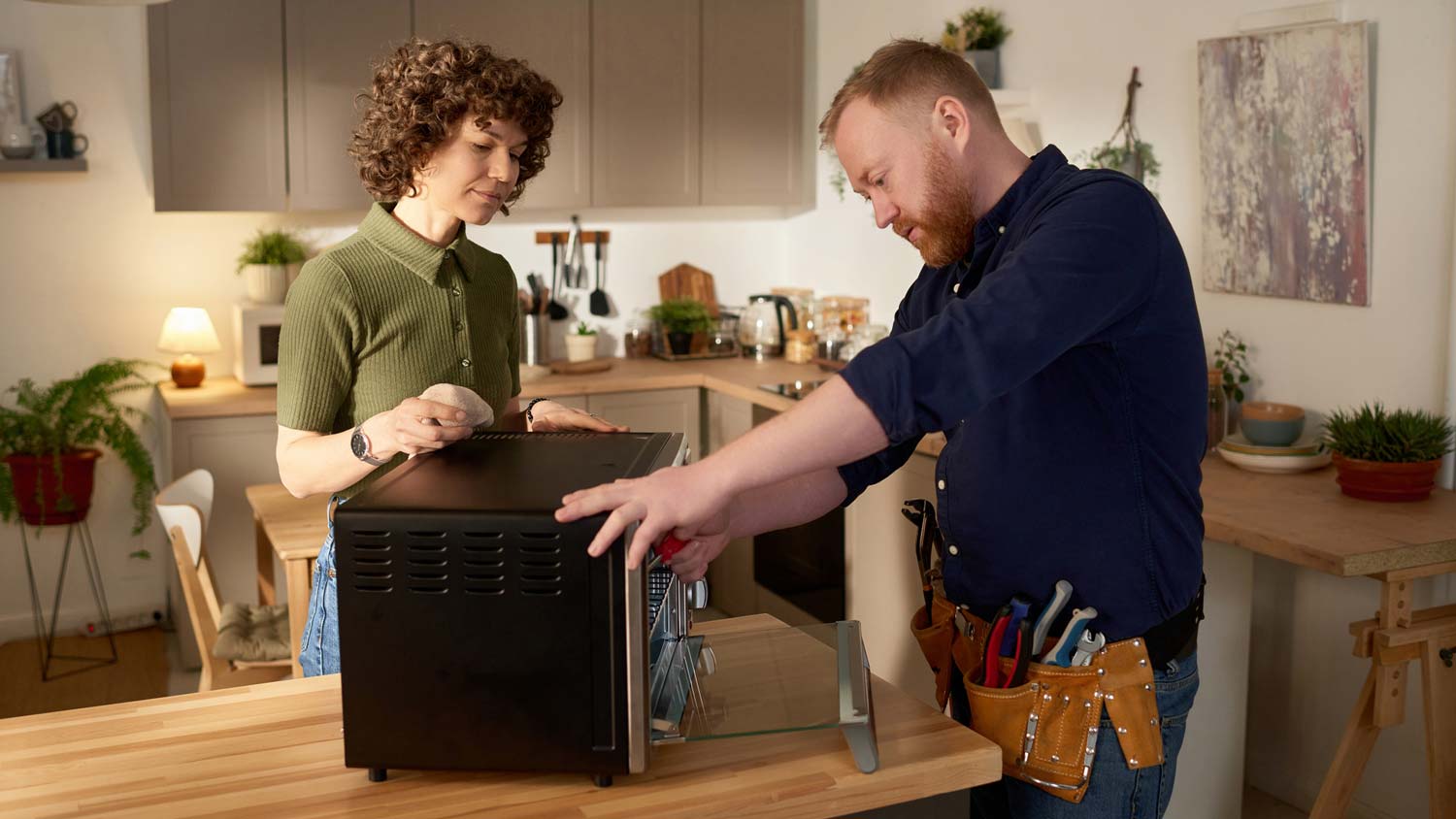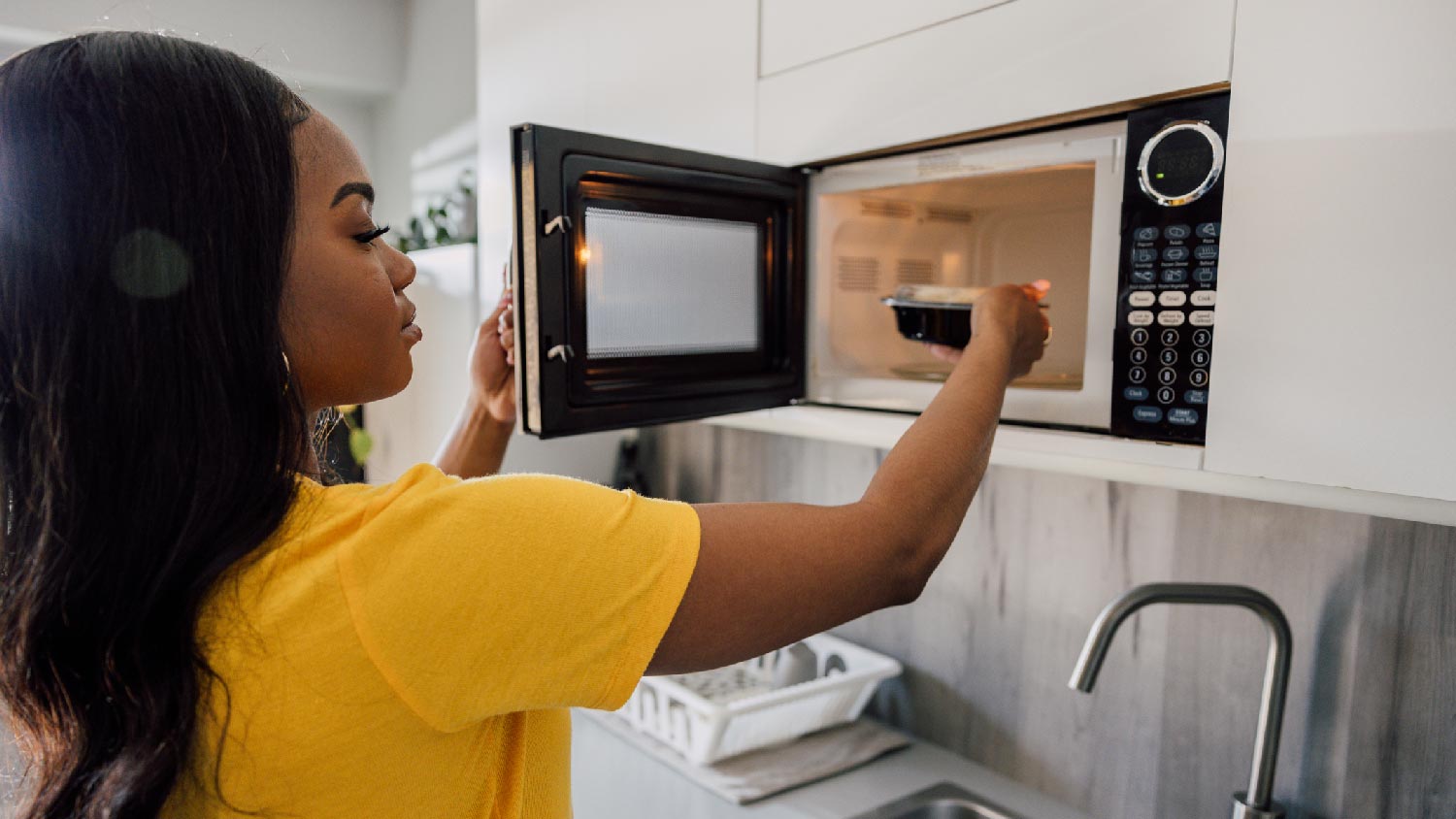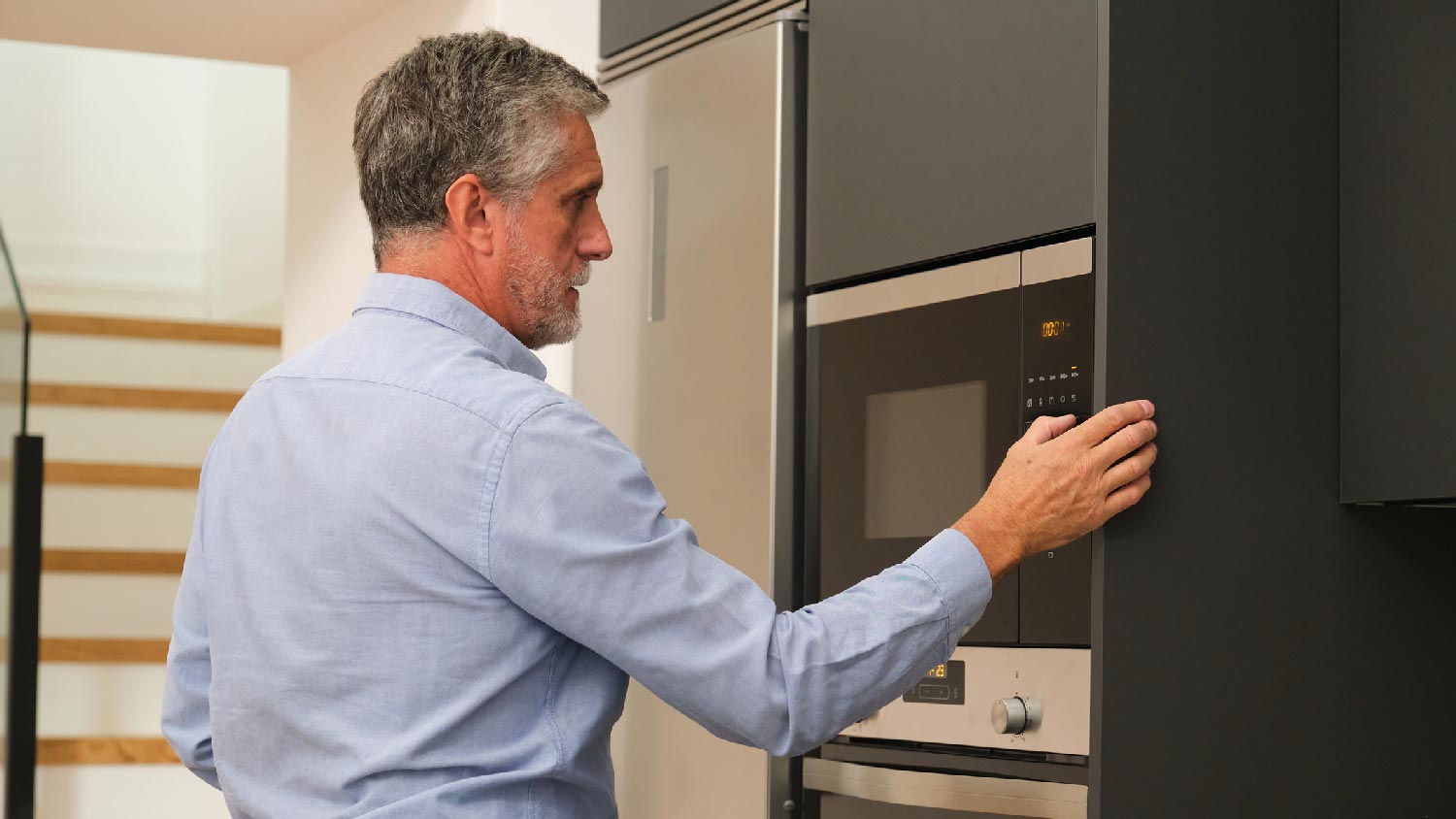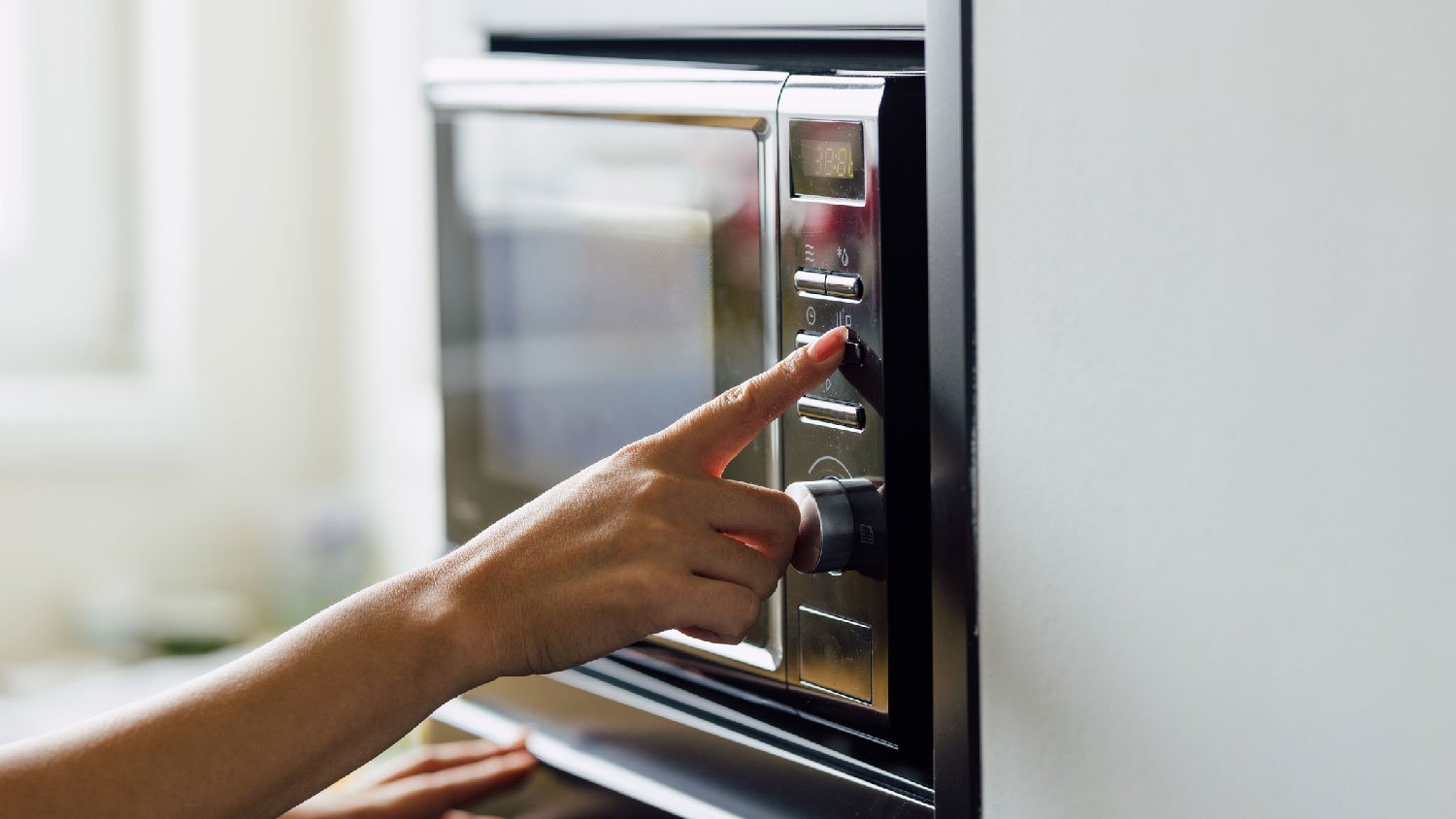
Get transparent microwave repair cost info for 2025. Learn what impacts price, compare repair vs. replacement, and find ways to save on your microwave repair.
If your garbage disposal seems to have kicked the bucket, you'll need to figure out whether you can repair or replace it


Your garbage disposal is supposed to be a super helper in the kitchen, grinding up scraps from your tuna sandwich lunch and making cleanup a breeze. After many years of hard work, though, it might show its age, indicating it’s time for you to replace your machine and start fresh. However, sometimes it’s possible to salvage it—so how do you know if you should repair or replace your garbage disposal?
Before you call the plumber for the umpteenth time, here are six problems that can plague your garbage disposal and whether repairing or replacing it is the best course of action.
If you’ve made sure it's plugged in (we know, we know), tried resetting it, checked the circuit breaker and wiring, and your machine is still not turning on, it may be beyond repair. However, before spending $150 to $950—the average cost to replace a garbage disposal, depending on the model you buy and labor cost—it may be a good idea to have it inspected and diagnosed by a local garbage disposal pro. A pro can identify the issue and recommend changing a part before replacing the entire unit when possible.
Find yourself frequently cleaning up puddles near your disposal? There might be cracks in the unit (common from regular use), a sign letting you know when it’s time to replace your garbage disposal. Double-check that all mounting bolts are tightly in place to confirm this is the case. Tightening them could be a simple fix.
Clogs can happen for various reasons, like throwing things down the disposal that you shouldn’t. These machines don’t like stringy foods like celery and bananas, and hard food like fruit pits and bones are a no-go. However, if your disposal clogs all the time despite your best efforts, the blades could have gone dull, or your disposal may simply be too small for the amount of work you need it to do.
If you suspect the blades are dull, you can try throwing a handful of ice, a cup of rock salt, and some lemon slices into the disposal. Run the water and then run the disposal until it stops grinding; if this trick doesn’t help sharpen the blades, it’s likely time to replace the machine.
Disposal sizes vary by their amount of horsepower, and you can usually correlate the power of the motor to the number of people who live in and use the machine in your home. Here’s a simple size guide:
1–2 person household: 1/3-horsepower motor
3–6 person household: 1/2- to 3/4-horsepower motor
5–8 person household: minimum 1-horsepower motor
8+ person household or restaurant: 2-horsepower motor
Note: Models with a 1-horsepower motor or higher will be notably larger and more expensive than the less-powerful models.

If your disposal still functions but it feels like it’s operating in slow motion, it might mean that the motor is beginning to fail or the blades are getting too dull to handle the job they’re supposed to do. If you think the blades are the problem, you can attempt the ice, salt, and lemon trick we outlined earlier, but if it doesn’t work, get your disposal replaced. Make sure you’re always running water when using the disposal.
Like the previous tip, a sign that the motor and blades could be failing is if your disposal smells bad. This smell is an indication that food isn’t getting chopped up enough, is getting stuck, and subsequently decomposing in the machine. Try sharpening the blades (the tip we shared will also help deodorize the machine, thanks to the lemon slices!).
If that doesn’t work, a nearby plumber or handyperson near you can disassemble the unit and clear out any food trapped inside that may be causing the foul odor. They can also provide the best recommendation for replacing or repairing your garbage disposal at that point.
Under almost any circumstance, avoid using harsh chemical cleaners or liquid clog removers in your disposer. A garbage disposal contains rapidly moving parts that can cause splashing and spraying of dangerous chemicals if someone turns it on. Their metal and plastic components don’t pair well with chemicals other than particular products. You can cause severe damage to the disposal if someone misuses them.
If your unit is noisy and making a humming sound but isn’t actually grinding up any food, the disposal is still receiving electrical power, but the motor is probably dead. Before you buy a new one, check that there aren’t any solid, hard food pieces (fruit pits, we’re looking at you again) stuck between the impeller and the shredder ring.
As with any appliance around the home, your garbage disposal won’t last forever. You can expect a garbage disposal to last 10 to 12 years without too much trouble. However, 15 years is a reasonable lifespan if you follow simple garbage disposal maintenance guidelines such as:
Use cold water when using your disposer to grind food.
Avoid placing grease, fat, pasta, and stringy foods in the disposer.
Never overload the appliance with too much food at one time. Place large amounts in the disposal slowly and intermittently with the water running.
Keep harsh chemicals out of the garbage disposal.
Occasionally, clean and sharpen the disposal with ice and citrus.
If you’re ready to call a plumber and take the plunge to buy a new garbage disposal, try these possible fixes first:
Try resetting it. Sometimes the ground fault circuit needs a breather to get the right amount of power to the unit.
Check and see if your current model is still under warranty. Chances are it won’t be, as most warranties only last two years, but you might have an extended warranty or have a faulty unit that failed within the coverage period.
Check the garbage disposal for a clog (the most common issue with disposals) and try and get it in working order again.
From average costs to expert advice, get all the answers you need to get your job done.

Get transparent microwave repair cost info for 2025. Learn what impacts price, compare repair vs. replacement, and find ways to save on your microwave repair.

Is your microwave plate not spinning? It’s not the end of the world, but it might be the end of your microwave. Use this guide to diagnose and fix the issue.

Why is your microwave smoking? Learn the most common reasons for smoke coming out of your microwave and how to address the issue safely.

Wondering why your microwave is buzzing? The sound could be more than just a nuisance. Learn about the possible causes and how to find a solution.

If your microwave keeps tripping the breaker, you need to understand why. Learn about common problems and how to keep your family and home safe.